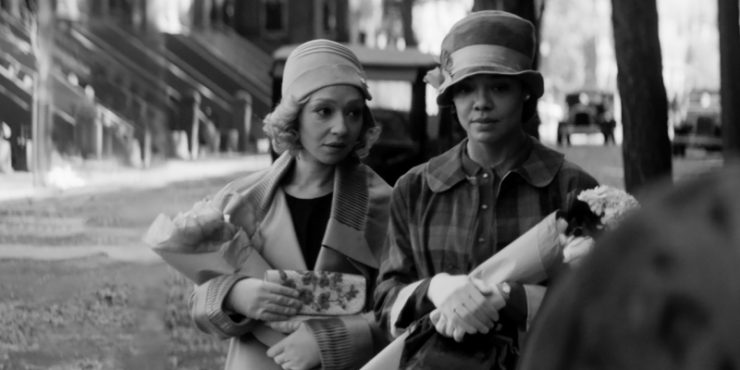Nella Larsen’s 1929 novel, Passing, is a landmark text. It’s provocative subject matter – racial passing – was a controversial subject then and still a bit taboo today. Rebecca Hall choosing this adaptation to be her directorial debut is courageous indeed, hurdling through cultural landmines to get toward a story about two women and the demons that can circle around any intimate relationship.
Tessa Thompson is Irene, a Black woman living in 1920s Harlem with her husband Brian (André Holland). Irene is light-skinned, so much so that she can occasionally pass in convenient stores or on the street. It’s not a habit she particularly admires in herself, but it becomes useful in certain situations, most of them frivolous. Her childhood friend, Clare (Ruth Negga), is not as modest in her passing. Clare is platinum blonde, with a Jean Harlow-like glow and a seductive charm. Her husband John (Alexander Skarsgård) is a racist white man who has no clue as to Claire’s true racial origins. When Clare and Irene meet for the first time in many years, Irene is shocked; first by her friend’s appearance and second by the blatant prejudice of her husband.
Hall leads Passing through many emotional circles, mostly between the two friends whose spite and envy lie below the surface of all their interactions. Clare’s reintroduction to her childhood friend makes her long for the days when she was unambiguously Black. For Irene, seeing Clare again brings with it all sorts of questions about her own actions, her own occasional passing, and her own middle class lifestyle in a time of lynching and segregation. The two friends deceive their husbands, but also themselves, both searching for a happiness that is forever out of reach due to the blatant racism (and sexism) of American society.
Passing is a film about race, but it is also about gender, marriage, sexuality, etc. Hall spares no themes even with the film at a tight 98 minutes long. It is a solid enough debut, even if it does become flat from time to time, both stylistically and thematically. This story is tricky business and Hall does well to keep it within the experiences of the two women, who both can feel the fragility of their happiness, even when it’s at its most buoyant. Negga, especially, as the emotionally adventurous Clare is a wonder to behold. Clare’s barely-restrained passion and energy sit in Negga’s eyes, which telegraph self-castigation while outwardly portraying loquacious camaraderie. Thompson’s role is tougher, much more opaque. Irene is in many ways the somber foil to Clare’s enthusiasm.
There is an assuredness to Hall’s direction and a deliberate style. Making a film about colorism and filming it in black and white is certainly a choice. Like most Twentieth Century tales of American racism, tragedy feels always just around the corner. Passing can’t help but telegraph this as it moves along, filling with dread until the ultimate release. The film’s politics get muddy, and it works best when it’s a story about the complexity of friendship. But the performances are exceptional, and well worth the price of admission (or your Netflix subscription fee).
Written for the Screen and Directed by Rebecca Hall










